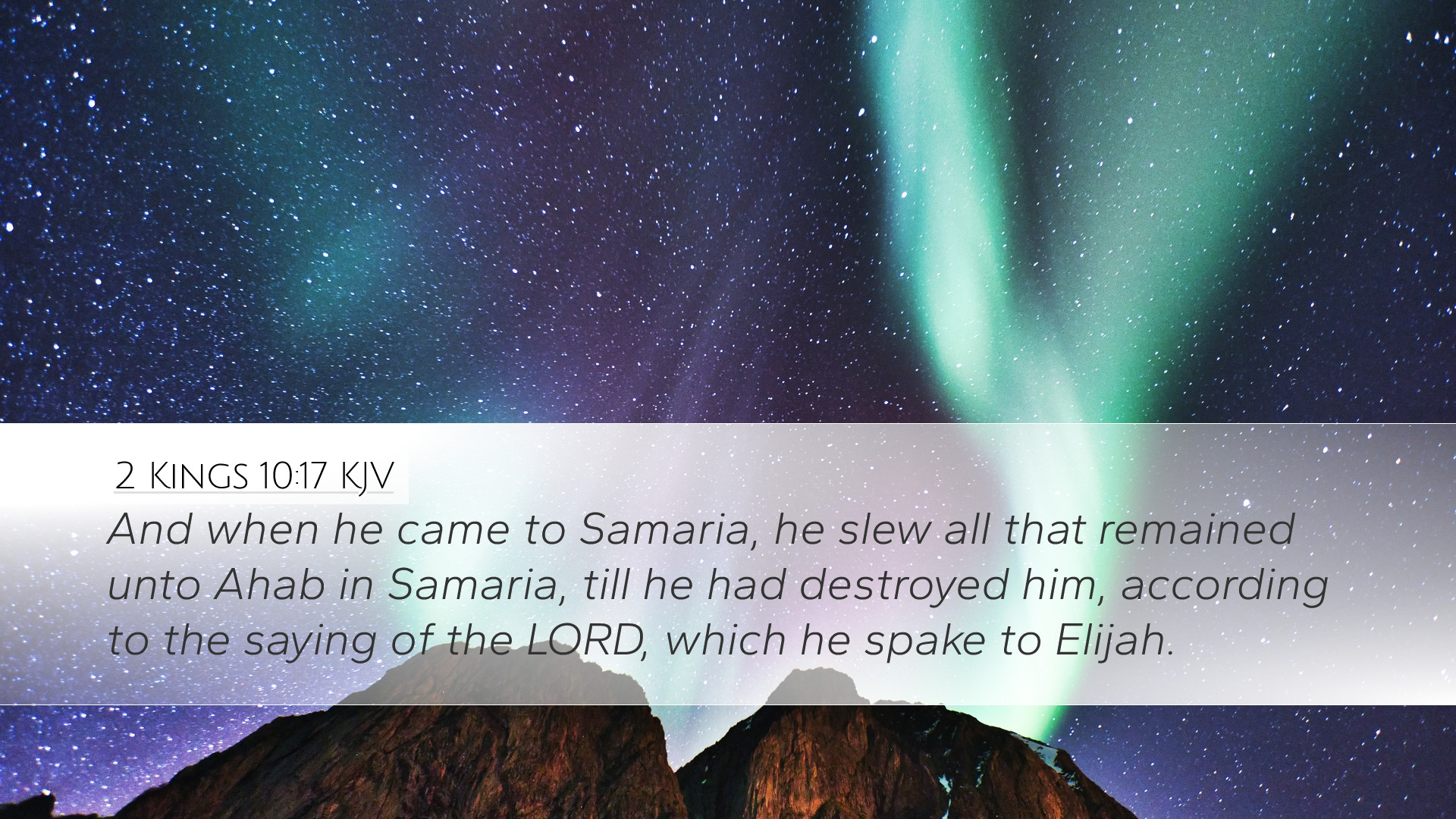Commentary on 2 Kings 10:17
2 Kings 10:17 states: "And when he came to Samaria, he slew all that remained unto Ahab in Samaria, till he had destroyed him, according unto the saying of the Lord which he spake by his servant Elijah."
This verse is critical in understanding the fulfillment of divine prophecy and the zealous execution of judgment against the house of Ahab. It signifies the culmination of God’s judgment as pronounced through Elijah, reflecting the seriousness with which God executes His will against idolatry and unrighteousness.
Contextual Overview
The historical context is essential in grasping the weight of this verse. Ahab, the king of Israel, was notorious for his idolatrous practices, particularly the worship of Baal, which drew Israel away from the worship of Yahweh. The prophetic voices, particularly that of Elijah, pronounced judgment against Ahab and his lineage due to their blatant transgressions.
Theological Insights
Divine Sovereignty and Judgment
According to Matthew Henry, this passage exemplifies God’s sovereignty over nations and His justice in executing judgment on those who oppose Him. Ahab’s descendants were not only complicit in their father's sins but propagated the idolatrous practices, which led to a collective culpability for their actions. God’s judgment was thus both a consequence of Ahab’s sins and a broader reflection of divine justice.
The Role of Jehu
Albert Barnes emphasizes the strategic importance of Jehu’s rise to power. Jehu is depicted as an instrument of God’s judgment. His zealous actions of slaying the remnants of Ahab’s family can be seen as a fulfillment of God’s promise made to Elijah, ensuring a complete eradication of Baal worship from Israel. Jehu acts decisively, showcasing the importance of leadership wielding authority both for justice and in alignment with God’s commandments.
Prophetic Fulfillment
Adam Clarke highlights the prophetic nature of this act, confirming the word of the Lord spoken by Elijah. The divine promise of judgment against Ahab’s household serves not only as a warning but as a reminder of God’s commitment to cleanse His people. Clarke suggests that the events surrounding Ahab’s family serve as a poignant lesson in obedience and fidelity to divine instruction.
Practical Applications
- The Weight of Leadership: Leaders have a profound impact on those they govern. Just as Jehu was tasked with executing God’s judgment, contemporary leaders are called to uphold justice and righteousness.
- Divine Justice: This passage serves as a reminder that God’s justice may not always be immediate but is certain. The eventual downfall of the wicked is a theme throughout Scripture.
- Obedience to God’s Calling: Jehu listened to the prophetic voice and acted. Believers today are encouraged to seek and follow God’s direction, understanding that obedience is a vital aspect of faith.
Conclusion
2 Kings 10:17 encapsulates the themes of divine judgment, leadership responsibility, and the fulfillment of prophecy. As described by the esteemed commentators—Henry, Barnes, and Clarke—this verse serves as both a narrative of Israel's tumultuous history and a profound theological statement about God's governance in human affairs. The destruction of Ahab's lineage illustrates God's persistent call for holiness among His people and the seriousness of sin in the sight of a holy God. For pastors, students, and theologians, this text remains a powerful reminder of the need for vigilance against unrighteousness and the importance of aligning with God's purposes in every aspect of life.


